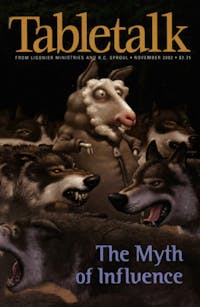
Request your free, three-month trial to Tabletalk magazine. You’ll receive the print issue monthly and gain immediate digital access to decades of archives. This trial is risk-free. No credit card required.
Try Tabletalk NowAlready receive Tabletalk magazine every month?
Verify your email address to gain unlimited access.
Recently, I was speaking with the president of a leading seminary regarding current trends within evangelicalism. As we discussed the future of evangelicalism in America, I conveyed my deep concern for the increasing theological apathy among many students, and I bemoaned the manner in which certain doctrinal standards seem to be casually disregarded in the name of peace, unity, and postmodernity. After all, the history of evangelicalism in America shows that liberalism emerged from within seminaries that were formerly the established guardians of principled orthodoxy.
Dr. David F. Wells, a leading voice from within evangelicalism and a keen observer of the warp and woof of Christian culture, has written passionately about this problem in books such as No Place for Truth and God in the Wasteland. More recently, his Losing Our Virtue: Why the Church Must Recover Its Moral Vision, calls the church to recognize its worth, both to its Bridegroom and to the culture in which it exists. All three books have been published by Eerdmans.
In Losing Our Virtue, Wells clearly admonishes the evangelical church to seriously consider the condition in which it finds itself—ignoring its foundation, forgetting its history, and, consequently, losing its virtue. In discussing the loss of appetite within evangelicalism for authentic proclamation of Christian understanding, character, and behavior, Wells writes, “. . . the seeds are now being abundantly sown out of which a new liberalism is already arising that will be as destructive to Biblical faith as was the older liberalism.” Few evangelicals have been bold enough to declare such sentiments.
Losing Our Virtue is recommended to those who have not grown apathetic regarding the state into which evangelicalism has plunged. It should be taken up and read by pastors, seminary presidents, and students who love the church and care for its purity.
